Landscape & Ecology Progress, 2018-22

We will cultivate sustainable landscapes that increase biodiversity and enrich all ecosystem services, which are vital to environmental and human health and well-being.
2018 Pitt Sustainability Plan Goals
- DESIGN: Adhere to Pitt’s Sustainable Landscape Design Guidelines in all new landscape designs.
- STANDARDS: Maintain at least 75% of landscaped areas in accordance with Northeast Organic Farming Association (NOFA) Standards for Organic Land Care by 2024.
- TREES: Increase tree canopy by 50% (from 2017 baseline).
- PLANTINGS: Replace 15% of lawn area with indigenous and adapted plants by 2030 (from 2017 baseline).
Where We Are: Lawn Reduction
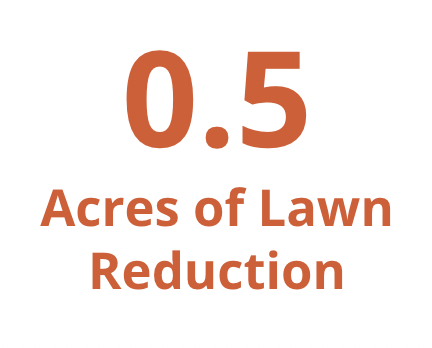
The University has worked to replaced lawns with more sustainable plantings on both level and hillside areas across campus. Most noticeably since 2017, decorative lawns have been removed between Hillman Library and Posvar Hall, adjacent to the Petersen Sports Complex fields, above the K Parking Lot, and below the Falk Laboratory School loading dock.
Since our 2017 baseline, Pitt has converted ~0.5 acres of lawn to native plantings. Future lawn reduction opportunities are regularly evaluated as suggested in the 2021 Institutional Master Plan (IMP) and by Pitt Grounds, in balance with campus needs for open space.
Where We Are: Open Space & Public Realm
As elucidated in the 2021 IMP, the 150-acre Pittsburgh campus includes nearly 80 acres of open space, of which 14 acres are considered “public realm” green space, shared with the community. The University’s goal is to increase the amount of public realm green space 15% by 2031, while also improving existing open spaces to the public realm standard. The 2021 Bigelow Boulevard transformation is the most visible manifestation of this strategy, with a wide variety of future projects in planning and design (see below).

Where We Are: Sustainable Landscapes
Newly Designed Landscapes:
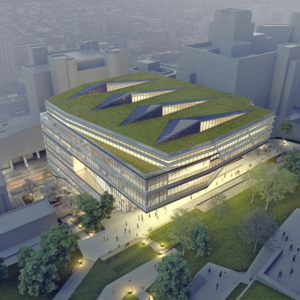
All new landscape designs adhere to Pitt’s Sustainable Landscape Design Guidelines, including (but not limited to) plantings, trees, green roofs, and edible, pollinator, and rain gardens. The largest strategy is Pitt’s “Hillside Framework Plan” for transforming 68 acres of upper campus with a unified design connecting people, place, and sustainable landscapes while reforesting to improve stormwater management and hillside ecosystems; under construction now, this strategy won national recognition in 2022 from the Society for College and University Planners.
Existing Landscapes:
Pitt Grounds has made a concerted effort to increase the number of perennials, native, and drought-tolerant plants for existing landscapes. Of new campus plantings since 2017, 95% are native species (including trees, shrubs, and groundcovers). In FY22, Pitt Grounds maintained ~ 75% of landscaped beds in accordance with NOFA Standards for Organic Land Care.
Electric Equipment:
In 2014, Pitt Grounds began transitioning its campus-wide equipment and vehicles from gasoline and diesel models to electric-powered options, helping reduce noise and air pollution on campus In 9 years, Pitt Grounds has gone from zero pieces of electric equipment to 56 (or ~25% of its handheld equipment). In 2022, Grounds added its first large area (stand on) electric mower. Additionally, the implementation of battery-powered blowers in all middle and campus zone has reduced gas-powered blower usage 92% annually.
Where We Are: Pollinators
The University of Pittsburgh works to both protect existing pollinators and create new campus spaces where pollinator communities can grow and thrive.
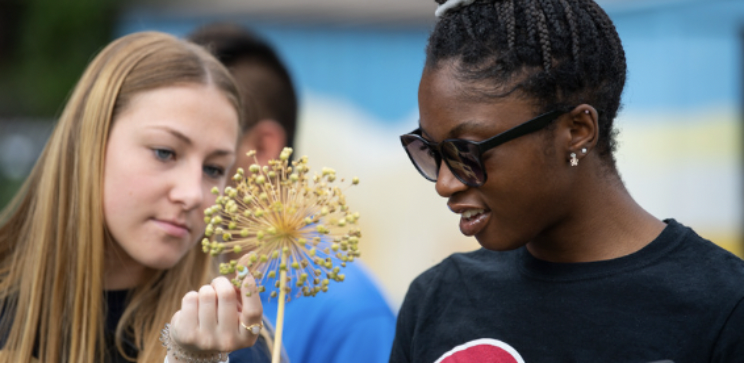
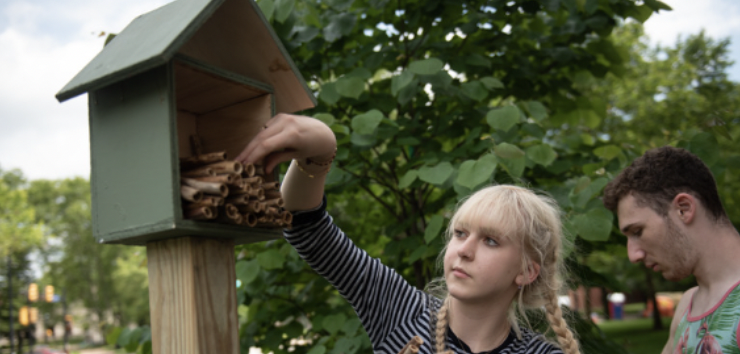
Bee Campus USA Certification:
The University’s Pittsburgh campus received its first Bee Campus USA designation in 2020 from the Xerces Society for Invertebrate Conservation. Bee Campus affiliates commit to supporting pollinators by establishing native plant habitats, providing nesting sites, reducing the use of pesticides, and providing educational opportunities about pollinators. This designation is renewed annually, with the University’s efforts highlighted in a Xerces’ Bee Campus USA report.
Pollinator Gardens:
The University’s Pittsburgh campus is currently home to 6 gardens specifically designed for pollinators, many of which house solitary bee houses that were designed and installed in 2019 as part of a Pitt student project. Two of these pollinator gardens are new since 2017, both originating from student projects: Posvar Pollinator Garden on Clemente (2021) and Posvar Relearn Our Land Garden (2022).
Pollinator Advisory Committee:
In 2019, Pitt’s Pollinator Habitat Advisory Committee was established to help the quality of our campus environments support healthy, native pollinator populations. The Committee also oversees Pitt’s annual Bee Campus USA renewal process and works to increase campus-wide education about the importance of pollinators, including an annual celebration of Pollinator Week(check out 2021 and 2022 Pollinator Week happenings).
Where We Are: Trees
Trees are integral to all University of Pittsburgh campuses, contributing beauty, stormwater management, ecosystem support, and mental health benefits.
Tree Campus Higher Education Certification: In 2021, the University’s Pittsburgh campus achieved its first national Tree Campus Higher Education designation from the Arbor Day Foundation for protecting and enhancing local tree canopy. This national certification honors universities and their leaders for fostering a tradition of excellence in tree care and education. Pitt’s Bradford campus has held a Tree Campus USA designation since 2015.
- Pitt’s Johnstown campus has been a certified Audubon Cooperative Sanctuary since 2019, when it was the first university campus in Pennsylvania and the eighth nationally to earn this designation.
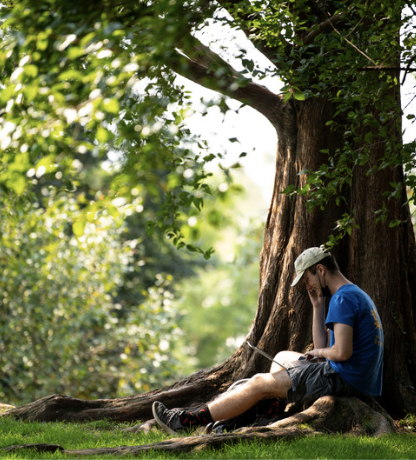
Tree Canopy: A tree inventory for the University’s Pittsburgh campus was completed in 2019, documenting nearly 4,000 existing trees of diverse species and maturities that provide 29.95 acres of tree canopy coverage (or 16.8% of the 177.4-acre IMP study area). Despite losing a number of trees to age, disease, or construction, over 210 net new trees have been planted on or adjacent to the Pittsburgh campus since 2017, with full tracking on our goal to grow tree canopy in progress.
Given the urban nature of the University’s Pittsburgh campus, existing tree needs, and infrastructure, the 2019 Campus Master Plan indicated only 4% canopy growth is likely on the Pittsburgh campus over the next 10 years.
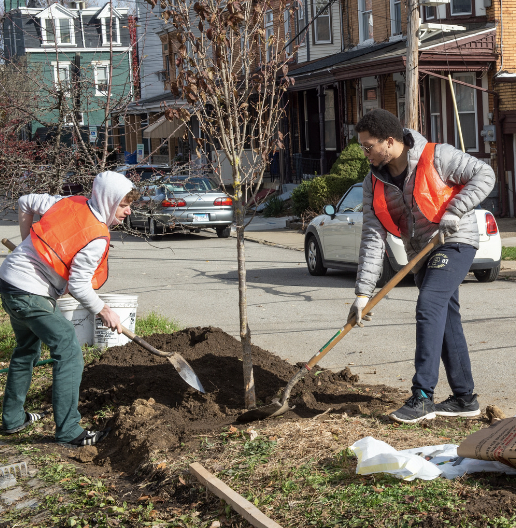
Campus Tree Advisory Committee:
In 2019, Pitt’s Campus Tree Advisory Committee was established to help to oversee the long-term preservation and expansion of the tree canopy on-campus, advance Pitt’s tree commitments, and help educate the Pitt community about the importance of trees.
Pitt Tree Tenders:
In 2022, Pitt began offering free Tree Tender trainings in partnership with Tree Pittsburgh, creating new opportunities for students and employees to learn tree care techniques and help maintain and grow tree canopy in Oakland and beyond. In the program’s first year alone, 78 Pitt community members became certified Tree Tenders, making them eligible to volunteer their expertise to regional community plantings and tree maintenance projects.
- This diverse and interdisciplinary committee developed the Campus Tree Care Plan (2021)